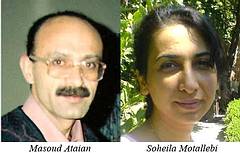Higher education in Iran still closed to Baha'is:
Iran’s new school year again excludes Baha’is
3 October 2008
NEW YORK — </SPAN>As the new academic year got under way, young Baha'is in Iran again found the door to higher education closed.
Although in its public stance the Iranian government maintains that Baha'is are free to attend university, reports over the past few weeks indicate that the policy of preventing Baha'is from obtaining higher education remains in effect.
Baha'i students attempting to gain admittance to universities and other institutions this fall found that their entrance examination results were frozen and their files listed as “incomplete” on the Web site of the national testing organization.
Baha’is who had successfully enrolled in universities in previous years continue to be expelled.
And those who have sought redress through the courts have been disappointed, their cases rejected.
“As has been the case for the last four years, the Iranian government continues to use a series of devious ploys to prevent young Iranian Baha’is from receiving higher education,” said Bani Dugal, the principal representative of the Baha’i International Community to the United Nations.
“The effect of the government’s policies is to close the doors of universities to Baha’is, despite Iran’s supposed commitment to international laws upholding the right to education.
“Our plea to the international community, and especially to professors, administrators and students everywhere, is that they raise their voices on behalf of Iranian Baha’i students,” said Ms. Dugal.
According to reports from Iran, the principal method this year by which authorities are preventing Baha’is from enrolling in university is by blocking their examination results and declaring their files “incomplete.”
The tactic was used last year, too, but this year it became evident that many of the Baha’i students had been identified earlier in the application process. When they tried to log on to the national university examination Web site, rather than seeing their exam results, they got a Web page with the words “Error – incomplete file.” (See screen shot in
Persian, and
English translation.)
The Web page to which they were automatically directed had a URL (Internet address) ending with the words “error_bah” – an apparent reference to the fact that their files were declared in “error” because they were Baha’is. (The complete address was
search sanjesh)
The error message is displayed despite the fact that Baha’i students had dutifully filled out all required information and successfully sat for the examination.
Last year, for the 2007-2008 academic year, of the more than 1,000 Baha’i students who sat for and satisfactorily completed the entrance examination, nearly 800 were excluded because of "incomplete files."
Without complete files, enrollment in all public and most private universities in Iran is impossible.
Students who have contested the fact that their files were improperly listed as incomplete have so far met a deaf ear in Iranian courts.
In a ruling last April in Branch 1 of the Court of Administrative Justice, a Baha’i student who filed a grievance against the national Education Measurement and Evaluation Organization (EMEO) had his case dismissed.
“In light of the fact that the (EMEO) does not recognize the plaintiff as having fulfilled the requirements, the plaintiff’s case has no merit and is thus dismissed,” the court ruled. (See court document in
Persian, and
English translation.)
The same court rejected the claim of another Baha’i university student who had been expelled because of his religious belief and had approached the court seeking readmission.
In rejecting that case, the court made a reference to the 1991 Golpaygani memorandum which outlines a broad plan to block the “progress and development” of the entire Iranian Baha’i community, including by expelling Baha’i university students.
The court wrote, “Considering that the plaintiff meets the criteria as defined by the (1991 Golgaypani memorandum) ratified by the Supreme Council of Cultural Revolution and is thus considered to have failed and has no valid argument to prove that there has been a violation of the guidelines in order to justify his claim, his grievance is not recognized.” (See court document in
Persian, and
English translation.)
Recent reports also indicate that Baha’is who are enrolled in universities – and there are now very few such Baha’is – continue to be expelled as their religious beliefs become known.
In August, for example, a student at Fazilat University was just three weeks from graduation when she was brought before authorities; when she refused to recant her faith, she was dismissed from the university.
Despite a record of deceitful dealings by the government, there is increasing evidence of support for Bahá'í students by many Iranians, both inside and outside of Iran.
Notable among them was an article by Ahmad Batebi, a prominent human rights activist now in exile. That article, “The Bahá’ís and Higher Education in Iran,” published 2 September 2008 in Rooz Online, protests the denial to Bahá’ís of access to higher education and the persecution of the Bahá’ís of Iran generally. (See article in
English and
Persian.)
Source:
Iran?s new school year again excludes Baha?is










